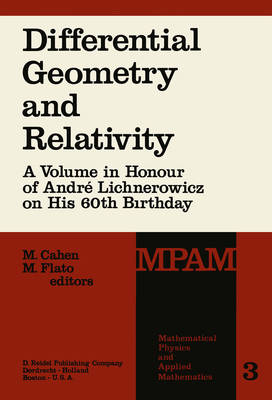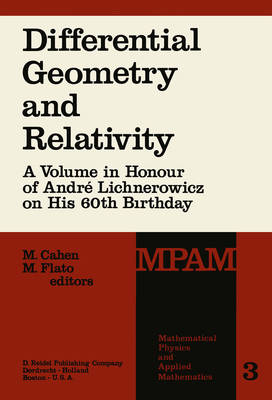
- Afhalen na 1 uur in een winkel met voorraad
- Gratis thuislevering in België vanaf € 30
- Ruim aanbod met 7 miljoen producten
- Afhalen na 1 uur in een winkel met voorraad
- Gratis thuislevering in België vanaf € 30
- Ruim aanbod met 7 miljoen producten
Zoeken
Differential Geometry and Relativity
A Volume in Honour of André Lichnerowicz on His 60th Birthday
€ 167,95
+ 335 punten
Omschrijving
On the occasion of the sixtieth birthday of Andre Lichnerowicz a number of his friends, many of whom have been his students or coworkers, decided to celebrate this event by preparing a jubilee volume of contributed articles in the two main fields of research marked by Lichnerowicz's work, namely differential geometry and mathematical physics. Limitations of space and time did not enable us to include papers from all Lichnerowicz's friends nor from all his former students. It was equally impossible to reflect in a single book the great variety of subjects tackled by Lichnerowicz. In spite of these limitations, we hope that this book reflects some of the present trends of fields in which he worked, and some of the subjects to which he contributed in his long - and not yet finished - career. This career was very much marked by the influence of his masters, Elie Cartan who introduced him to research in mathematics, mainly in geometry and its relations with mathematical physics, and Georges Darmois who developed his interest for mechanics and physics, especially the theory of relativity and electromagnetism. This par- ticular combination, and his personal talent, made of him a natural scientific heir and continuator of the French mathematical physics school in the tradition of Henri Poincare. Some of his works would even be best qualified by a new field name, that of physical ma- thematics: branches of pure mathematics entirely motivated by physics.
Specificaties
Betrokkenen
- Uitgeverij:
Inhoud
- Aantal bladzijden:
- 320
- Taal:
- Engels
- Reeks:
- Reeksnummer:
- nr. 3
Eigenschappen
- Productcode (EAN):
- 9789401015103
- Verschijningsdatum:
- 15/10/2011
- Uitvoering:
- Paperback
- Formaat:
- Trade paperback (VS)
- Afmetingen:
- 152 mm x 223 mm
- Gewicht:
- 469 g

Alleen bij Standaard Boekhandel
+ 335 punten op je klantenkaart van Standaard Boekhandel
Beoordelingen
We publiceren alleen reviews die voldoen aan de voorwaarden voor reviews. Bekijk onze voorwaarden voor reviews.









